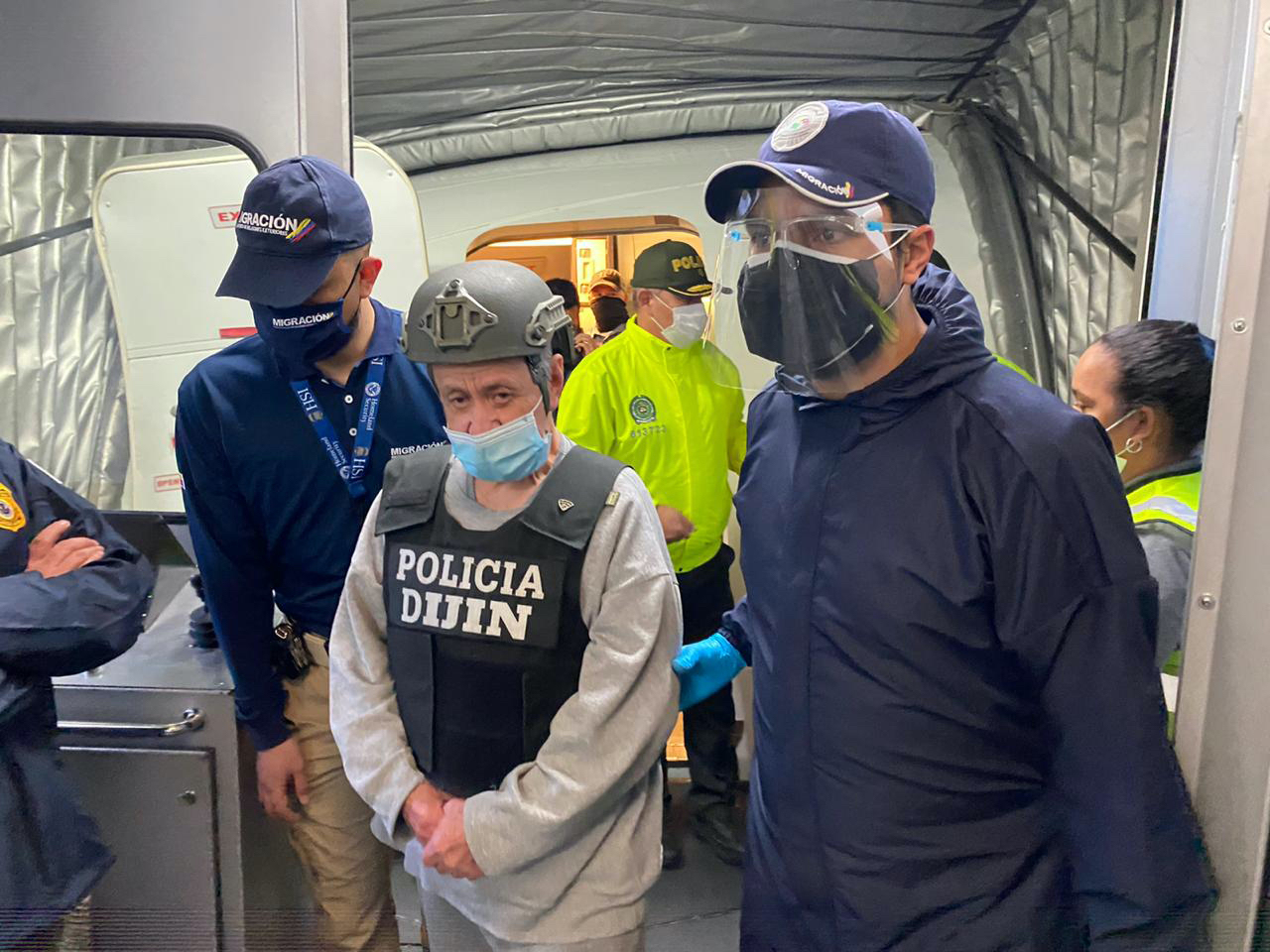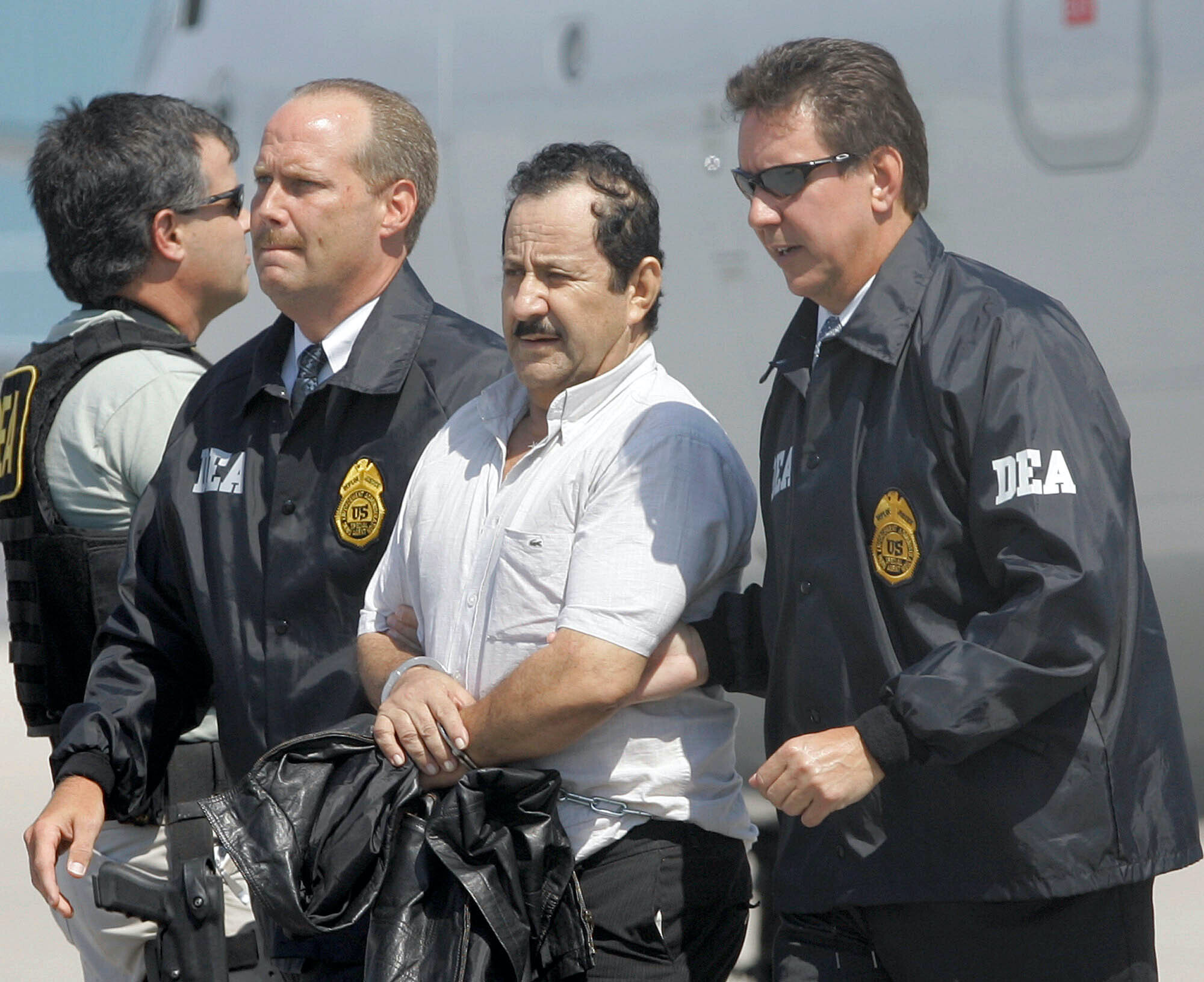

In this photo released by the Colombian Migration Press Office, ex-paramilitary commander Hernán Giraldo Serna, center, is escorted upon arrival at the El Dorado airport after being deported from the U.S. to Bogota, Colombia, Monday, January 25, 2021. (Colombian Migration Press Office via AP)
By ASTRID SUÁREZ, Associated Press
BUCARAMANGA, Colombia (AP) — On the north coast of Colombia there is anxiety over the return to the South American country of one of the most feared former paramilitary commanders: Hernán Giraldo Serna. “El Patrón” (the boss) or “El Taladro” (the drill, as he became known for sexually abusing girls in the area) stepped on Colombian soil Monday after finishing a 16-year sentence in a U.S. prison for drug trafficking earlier this month.
Giraldo, 74, was deported from the U.S. and immediately taken into custody by authorities in Colombia, where he is expected to serve time for crimes against humanity, including torture, forced displacement of people, sexual slavery and kidnapping, as well as drug trafficking.
A photo provided by Colombian immigration authorities showed Giraldo stepping onto a jet bridge wearing a surgical mask and a bulletproof vest on top of gray sweatpants. Another photo showed him walking through a building with heavily armed police ahead and behind him.
Giraldo was first arrested in Colombia for those crimes in 2006, but he was extradited to face charges in the U.S. in 2008.


In this May 13, 2008 file photo, Colombian paramilitary Hernán Giraldo Serna, second right, is escorted by U.S. DEA Agents at his arrival in Opa-locka, Fla. (AP Photo/Alan Diaz, File)
While in custody in the U.S., he cooperated with Colombian authorities and in 2018, he was sentenced in his homeland to 40 years in prison after confessing to more than 700 crimes affecting 10,600 victims. That prison term was reduced to eight years thanks to his cooperation under a special “Justice and Peace” system created to try paramilitary groups as part of the country’s effort to end decades of conflict.
His defense team can now request his conditional freedom for participating in that system and for showing good conduct while in prison in the U.S., but Giraldo would have to agree to continue collaborating with authorities looking into other crimes he is accused of committing between 1980 and 2006.
“The time in the United States must be counted (in Colombia), because he was extradited and sentenced there for a crime related to the Colombian armed conflict. Drug trafficking was one of the products of paramilitarism,” Magistrate Carlos Pérez, president of the Justice and Peace Chamber in Barranquilla, recently told The Associated Press.
Giraldo’s criminal life began between the 1970s and 1980s, when he went from growing coffee to growing marijuana. The business took off, and he became the leader of dozens of farmers in the north of Colombia. Soon, his illegal, peasant self-defense group began vying with the Revolutionary Armed Forces of Colombia for control of the Sierra Nevada de Santa Marta, an isolated mountain range in the northern part of the country.
The groups’ disputes lasted until 2006, when Giraldo and other paramilitaries agreed to demobilize and face the justice system.
Colombian authorities accused Giraldo of abusing girls, ages 11 to 15, between 1982 and 2005. More than three dozen victims spoke during hearings in his case.
“I was afraid to say no to him because people say that he ordered killed anyone who did not do what he wanted,” one of the victims, who was 12 when she was raped, told authorities. The AP generally does not identify victims of sexual abuse.
In 1983, Giraldo ordered his armed men to bring a 13-year-old girl to his farm to abuse her. She became pregnant with twins, one of whom died during labor due to a lack of medical attention. The day after she gave birth, Giraldo raped her again, according to her testimony during the hearings.
Two years later, Giraldo raped the girl’s 14-year-old sister. She gave birth to a girl in 1986.
“It was a complex process for them to recognize that they were victims. Some were sisters and did not know that one had been raped the same as the other,” said Ángela Cerón Lasprilla, director of the Alliance Initiative of Colombian Women for Peace, an organization that represented the victims during Giraldo’s criminal proceedings.
Some of those children had been recruited into Giraldo’s gang and rearmed after his extradition. Cerón said they have opposed the women’s decision to testify.
Prison has taken a toll on Giraldo. His nephew, Nodier Giraldo, who was extradited to the U.S. with his infamous uncle, told the AP they spent time in prisons where they would only get an hour of sunshine every 20 days.
Some of Giraldo’s victims fear he will regain control of the Sierra Nevada de Santa Marta now that he is back in Colombia. They cited their fear as the reason for declining interview requests from the AP.
Even though Giraldo’s group, the Tayrona Bloc, demobilized in February 2006, some of its 1,100 members, including a number of Giraldo’s relatives, continued to commit crimes.
“The heirs of Hernán Giraldo, quite numerous due to the fact that he exercised sexual violence against girls and adolescents, were divided in a dispute for power, in which, since 2007, 12 armed groups have taken part,” the national Ombudsman’s Office said in a 2018 report.


